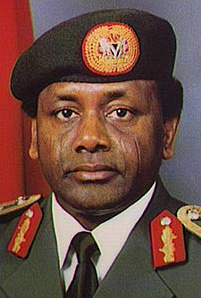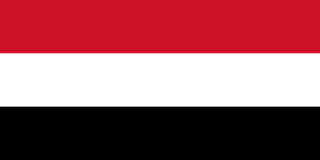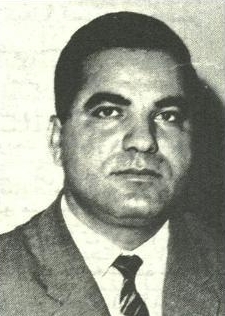
The politics of Libya has been in an uncertain state since the collapse of the Libyan Arab Jamahiriya in 2011 and a recent civil war and various jihadists and tribal elements controlling parts of the country. On 10 March 2021, the interim Government of National Unity (GNU), unifying the Second Al-Thani Cabinet and the Government of National Accord was formed, only to face new opposition in Government of National Stability, until Libyan Political Dialogue Forum assured the ongoing ceasefire.

Muammar Muhammad Abu Minyar al-Gaddafi, was a Libyan revolutionary, politician and political theorist who ruled Libya from 1969 until his assassination in 2011 by rebel forces. He first served as Revolutionary Chairman of the Libyan Arab Republic from 1969 to 1977 and then as the Brotherly Leader of the Great Socialist People's Libyan Arab Jamahiriya from 1977 to 2011. Initially ideologically committed to Arab nationalism and Arab socialism, Gaddafi later ruled according to his own Third International Theory.

Sani Abacha was a Nigerian military officer and politician who ruled as the military head of state after seizing power in 1993 until his death in 1998. Abacha's seizure of power was the last successful coup d'état in Nigerian military history.

Saif al-Islam Muammar al-Gaddafi is a Libyan political figure. He is the second son of the late Libyan leader Muammar Gaddafi and his second wife Safia Farkash. He was a part of his father's inner circle, performing public relations and diplomatic roles on his behalf. He publicly turned down his father's offer of the country's second highest post and held no official government position. According to United States Department of State officials in Tripoli, during his father's reign, he was the second most widely recognized person in Libya, being at times the de facto prime minister, and was mentioned as a possible successor, though he rejected this. An arrest warrant was issued for him on 27 June 2011 by the International Criminal Court (ICC) for charges of crimes against humanity against the Libyan people, for killing and persecuting civilians, under Articles 7(1)(a) and 7(1)(h) of the Rome statute. He denied the charges.

Human rights in Libya is the record of human rights upheld and violated in various stages of Libya's history. The Kingdom of Libya, from 1951 to 1969, was heavily influenced and educated by the British and Y.R.K companies. Under the King, Libya had a constitution. The kingdom, however, was marked by a feudal regime, where Libya had a low literacy rate of 10%, a low life expectancy of 57 years, and 40% of the population lived in shanties, tents, or caves. Illiteracy and homelessness were chronic problems during this era, when iron shacks dotted many urban centres on the country.

Muammar Gaddafi became the de facto leader of Libya on 1 September 1969 after leading a group of young Libyan Army officers against King Idris I in a bloodless coup d'état. After the king had fled the country, the Revolutionary Command Council (RCC) headed by Gaddafi abolished the monarchy and the old constitution and established the Libyan Arab Republic, with the motto "freedom, socialism and unity".

The Libyan–Sudanese relations refers to the long historical relations between Libya and Sudan, both are Arab countries.

Wanis al-Qaddafi was a Libyan politician. He held many positions in the era of the Kingdom of Libya and was the tenth Prime Minister of Libya from 4 September 1968 to 31 August 1969, when his government was overthrown by Muammar Gaddafi.

The Revolutionary Command Council was the twelve-person governing body that ruled the Libyan Arab Republic after the 1969 Libyan coup d'état by the Free Officers Movement. Its chairman was Muammar Gaddafi, who had the most influence. It was ideologically Arab nationalist, republican, anti-imperialist and pan-Arabist.

The Kingdom of Libya, known as the United Kingdom of Libya from 1951 to 1963, was a constitutional monarchy in North Africa which came into existence upon independence on 24 December 1951 and lasted until a coup d'état on 1 September 1969. The coup, led by Muammar Gaddafi, overthrew King Idris and established the Libyan Arab Republic.

Umar Abdullah el-Muhayshi, also transliterated as Omar al-Meheshi, was a Libyan army officer and a member of the Libyan Revolutionary Command Council that ruled Libya after the 1969 Libyan coup d'état.

Mustafa Abdul Jalil is a Libyan politician who was the Chairman of the National Transitional Council from 5 March 2011 until its dissolution on 8 August 2012. This position meant he was de facto head of state during a transitional period after the fall of Muammar Gaddafi's government in the Libyan Civil War, and until the handover of power to the General National Congress.
Omar Mokhtar El-Hariri was a leading figure of the National Transitional Council of Libya who served as the Minister of Military Affairs in 2011, during the Libyan Civil War. He controlled the National Liberation Army and the Free Libyan Air Force from March to May 2011. He served on the council Executive Board before being replaced by Jalal al-Digheily, and he headed Military Affairs in the unicameral National Transitional Council legislature.
The killing of Muammar Gaddafi took place on 20 October 2011 after the Battle of Sirte. Muammar Gaddafi, the deposed leader of Libya, was found west of Sirte after his convoys were attacked by NATO aircraft, as part of the 2011 NATO military intervention in Libya. He was then captured by National Transitional Council (NTC) forces and was killed shortly afterwards.

The 1969 Libyan coup d'état, also known as the al-Fateh Revolution or the 1 September Revolution, was carried out by the Free Officers Movement, a group of military officers led by Colonel Muammar Gaddafi, which led to the overthrow of the Senussi monarchy of King Idris I and the creation of the Libyan Arab Republic.

Matoug Adam was a Libyan politician, civil servant and poet. He served as the Libyan Minister of Tourism from January 1968 to June 1969. He then served as the last Interior Minister of the Kingdom of Libya from June 1969 to 31 August 1969, when the royal government was overthrown by Muammar Gaddafi.
Capital punishment in Gabon was officially abolished for all crimes in 2010. Gabon's last execution took place in 1985. Prior to abolition, Gabon was classified as de facto abolitionist, or "abolitionist in practice," due to the length of time since their last execution.

The 1993 coup d'état was a failed military coup initiated by the Warfalla senior military officers against Libyan leader Muammar el-Qaddafi on 22 October 1993. The coup was led by Khalifa Haftar, a leading senior officer in the Libyan Army who later defected during the coup. The result was the execution of many senior officers and the installment of loyal members.
Bashir Saghir Hawadi, also transliterated as Hawady or Houadi, is a Libyan major general who served under Muammar Gaddafi. He was among the twelve original members of the Libyan Revolutionary Command Council, the chief judge of the Libyan People's Court, and the General Secretary of the Arab Socialist Union.
Mohammed Emhamed Awad Najm, also transliterated as Muhammad Nejm, was a Libyan major and political figure. He was one of the original twelve members of the Libyan Revolutionary Command Council and also served as Foreign Minister.












